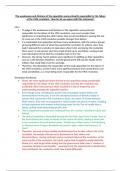The weaknesses and divisions of the opposition were primarily responsible for the failure
of the 1905 revolution.’ How far do you agree with this statement?
Intro
To judge if the weaknesses and divisions of the opposition were primarily
responsible for the failure of the 1905 revolution, one must consider their
significance in impacting the other factors that are all interlinked in causing the tsar
to come out of the 1905 revolution possibly stronger than before.
It is undeniable that opposition did have many weaknesses, with the various groups
all having different aims of what they wanted the revolution to achieve. Also, they
hadn’t planned the revolution to take place when it did, and during the revolution
there wasn’t a sole person who they could all look up to and follow, causing chaos
and reducing the threat that the revolution had on the Tsar.
However, the strong Tsarist policies were significant in splitting up their opposition,
such as in the October Manifesto, and the government still had the loyalty of the
military that could help crush the uprisings.
Therefore, this diminishes the responsible of the weak opposition for the failure of
the 1905 revolution, as there were more significant factors that caused them to be
weak and divided, as a result being more responsible for the 1905 revolution.
Revolution Accidental
Firstly, the most significant factor that led to the opposition being considerably
responsible for the failure of the 1905 revolution was that the revolution was
accidental rather than planned, which resulted in a lack of leadership and
understanding amongst the opposition parties.
Even though many revolutionary parties had encouraged various strikes and
demonstrations in the past, it was the unexpected events of Bloody Sunday in
January that caused the 1905 revolution to begin. As a wave of strikes followed
these events, they were not organised or united under one person or party, resulting
in these separated and random strikes being easier for the Tsar to handle than a
whole, unified strike demanding specific aims.
This is supported by people were striking all over the country, including in Latvia and
Poland.
The lack of leadership is illustrated through the fact that, apart from Trotsky, none of
the Social Democrats made an impact on the course of events, playing a minor part
in the revolution. As Lynch further states, “Hardly any of them were in St Petersburg
or Moscow when it began. Revolution occurred in spite, rather than because, of
them”.
Therefore, because of these leading revolutionaries fear to take a direct role in the
revolution, the people of Russia were abandoned in their strikes and
demonstrations, causing confusion and an eventual failure of the revolution. In the
early months of the revolution, the tsarist regime had struggled to understand the
threat of it, with Sergei Witte stating that the government policy was a “mixture of
cowardice, blindness and stupidity”, meaning if only the experienced revolutionaries
had contributed, the revolution could have ended differently.




